Intro To Reactivity In Dogs
Having a dog in your life is a huge responsibility, but having a reactive dog is… well… one of the toughest things you can experience with your dog.
I’ve been through this with Indie. It’s the entire reason I became a trainer. But you, luckily, don’t need a to become a trainer to help your reactive dog. All you need to do? Is start right here.
Please note!
This post has been mainly AI Generated from the video below! If you notice any weird phrasing?
Ping me an email and let me know, because I clearly missed it when editing!
Reactive dogs are a real passion of mine, I love them to pieces.
I don’t call them aggressive, I don’t call them anything like that, to me, they are just grumpy.
Because let’s face it, we’ve all been in that mood where we don’t want socialise, which, during COVID, I think we can all really understand that.
So yeah, today we’re going to cover a few subjects.
we’re going to do kind of a basic introduction as to what a reactive dog is, and the difference between reaction reactivity and aggression. And we are also going to cover what reactive dogs look like. whether there’s any particular breeds that are more reactive than others, we are going to discuss why some dogs are reactive.
And then I want to give you some quick tips as to how you can live your life with a reactive dog or to start to start that process of training and moving forwards together. Then once all that’s done, I’m going to do a whole bunch of questions and answers from my wonderful Instagram live audience who are with me whilst I’m recording this.
So if you are listening to this on the podcast or reading the blog, please do come and join us for some of the Instagram lives to make sure that your questions get answered.
It’s good to know that reactivity is not something you have to face alone. In fact, I’m releasing a super intense course, aka Rebarkable Reactives about it, so go sign up and I’ll walk you through how to get through this with your dog.
What Is A Reactive Dog?
A reactive dog is a dog who has a lot of feelings about a certain thing, this thing can be a scary thing. It could be an exciting thing. But typically they come across in the same way. They used to be a lot of barking and lunging something that I call a war dance.
And there was reason for this, and I will get into that in just a minute.
A reactive dog is just the just the dog who doesn’t understand how to process a certain feeling or emotion in a way that is productive to society, shall we say? Because isn’t it? It’s really tough owning a reactive dog I know I really truly do know and sympathise with all of you here who are in the same boat.
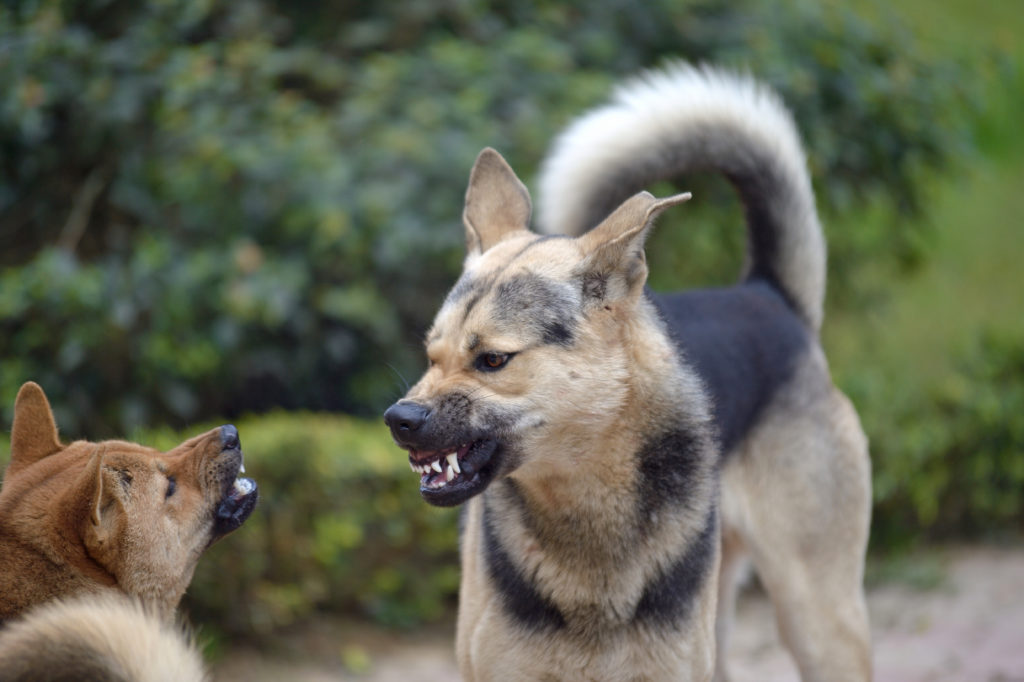
Is My Dog Aggressive Or Reactive?
I get asked this question so much. To me, the best way of explaining it is that the demonstration of their emotion is aggressive. Whereas the dog themself is usually suffering from reactivity.
And I realise that’s a really fine line.
But it’s basically just nomenclature.
A reactive dog will potentially show aggressive displays. But it’s not necessarily that the dog is aggressive, because to me an aggressive dog, as opposed to a reactive dog, is doing it with no reason, as such.
I often describe a reactive dog is that kid in the playground who uses their fists before they use their words.
Basically what we are trying to teach our reactive dog through training through various things that we’ll go through later, is to use their words to go I’m uncomfortable without going shouty, shouty, lunge, be scary.
That’s a really difficult thing to communicate to a dog though, isn’t it? So I hope that makes that clear as to what I believe the difference is between reactivity and true aggression.
I’m actually not genuinely certain any dog is truly aggressive. Because there’s always a reason.
There’s always a reason and all we’ve got to do is take moves and steps to understand what that reason is. So that we can we can make that change because that’s the important part. Right? We need to we need to make sure that they are comfortable and happy in their environment. Which is a big ask.
What Does A Reactive Dog Look Like?
What does reactivity look like reactivity is, as I’ve said, a demonstration of emotions. Typically, the most typical way you will see a reactive dog react is with barking and lunging.
These are a very loud way to say go away to another dog another person to an object to I think they want to chase even, it’s a way that they want to instigate their solutions.
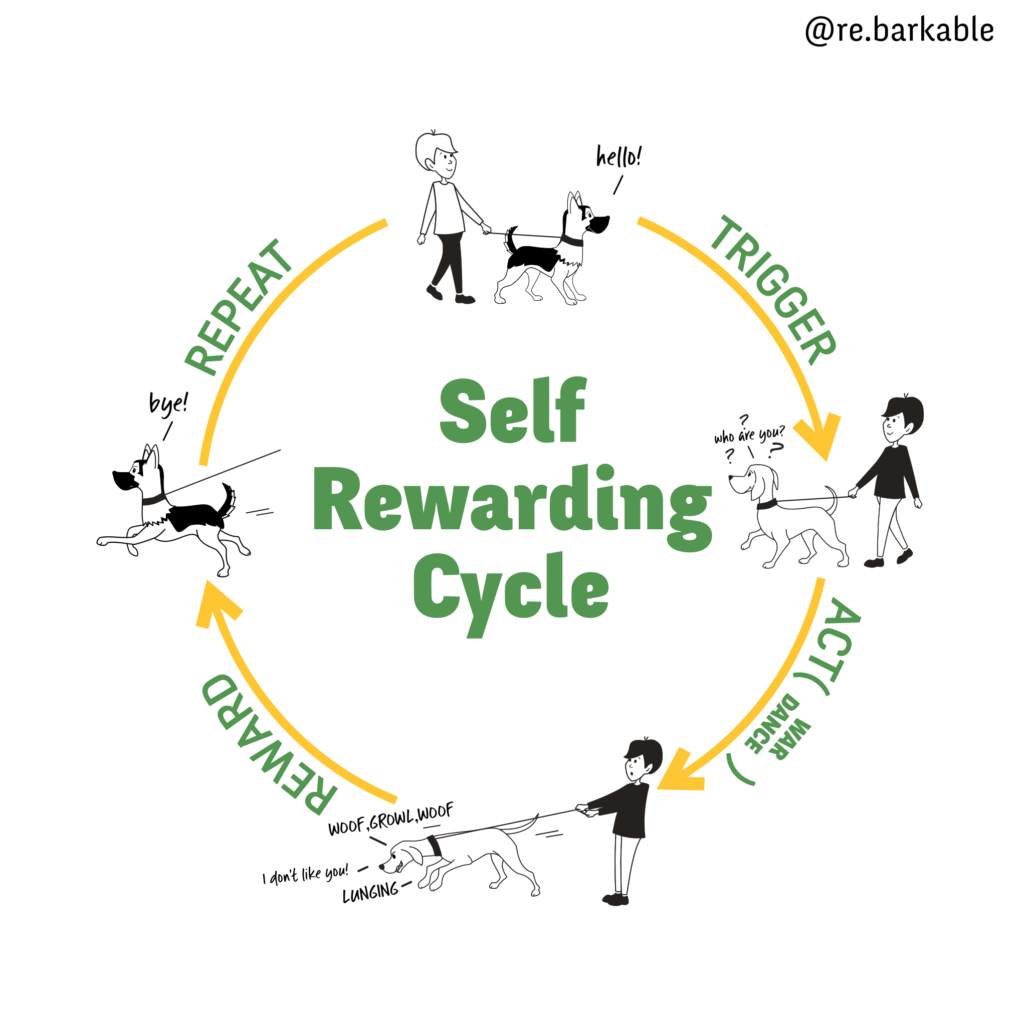
And it just, like I said, it becomes like this self rewarding behaviour. So your dog learns, if I bark and lunge at this other dog, or at this person at this duck (Shh, haha, I don’t know) various different triggers. But if I perform these, these set of actions, the scary thing goes away.
That departure of the scary thing is the reward.
I talk a lot about self-rewarding cycles, because they are a very interesting thing.
I always feel that if we can get if we can understand that cycle of reward, we can then understand how to break it, and how to change that into a more desirable outcome.
In this instance, typically barking lunging, they learn that that makes scary thing goes away. And suddenly their safety and happiness is restored. It’s fairly simple, right?
If you do ever have any questions just either direct message me or come to the lives because they are fun.
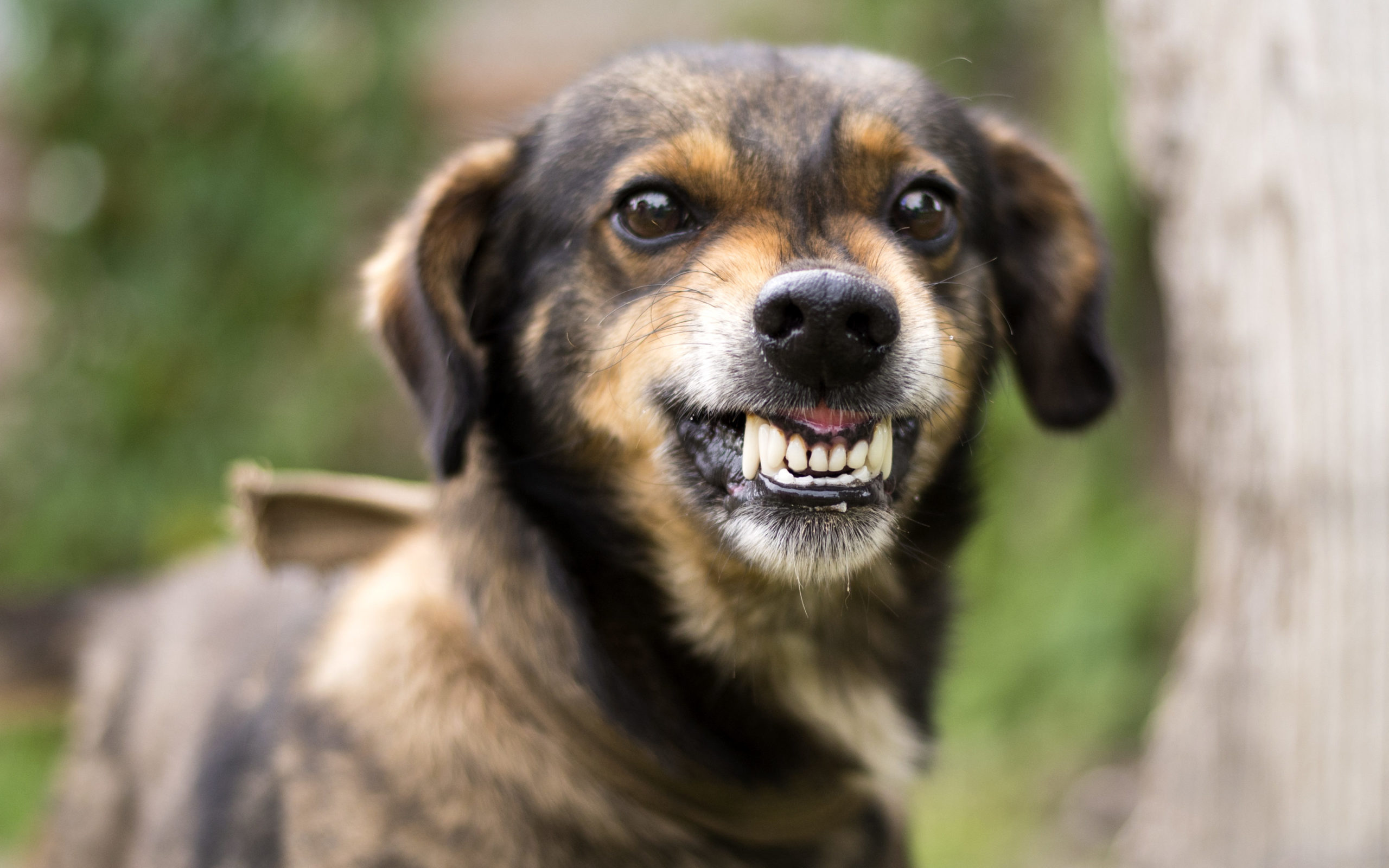
Are Some Breeds More Likely To Be Reactive?
I hate to say and I don’t want to typecast in any, in any way, shape or form.
But yes, I find that dogs who are bred for alertness are it’s like alertness and anxiety, which or fear are kind of it’s like our ancestors who selectively bred these dogs honed in on that particular emotion and feeling of our dogs to achieve their goal.
It’s like they’ve slightly tipped over from the Confident side of awareness, to anxiety, and if we can tip it back, the that’s how we start the training. Right? So understanding and then that so that means that certain breeds such as German Shepherds, Border Collies, pit bulls, a lot of bull breeds, in fact, can be more prone and livestock guardians.
So like any livestock guardian, they too can all become very, very over aware of their surroundings and over aware of what’s going on around them. And these are things that a sent to me make obvious links towards reactivity.
What a well bred variety of any other breeds that I’ve mentioned, will not show we activity. Those that are poorly bred or have been ill considered breedings are going to possibly have a predisposition to this there is a reason that we look at if you Google reactive dog and go to an image search, you will get a certain category of dogs.
This does not mean that these are the only dogs that get this because this is this is a really, really big point.
It doesn’t matter whether you’ve got a Labrador golden retriever Chihuahua, a Cavalier King Charles, a sighthound, any sort of dog can become reactive.
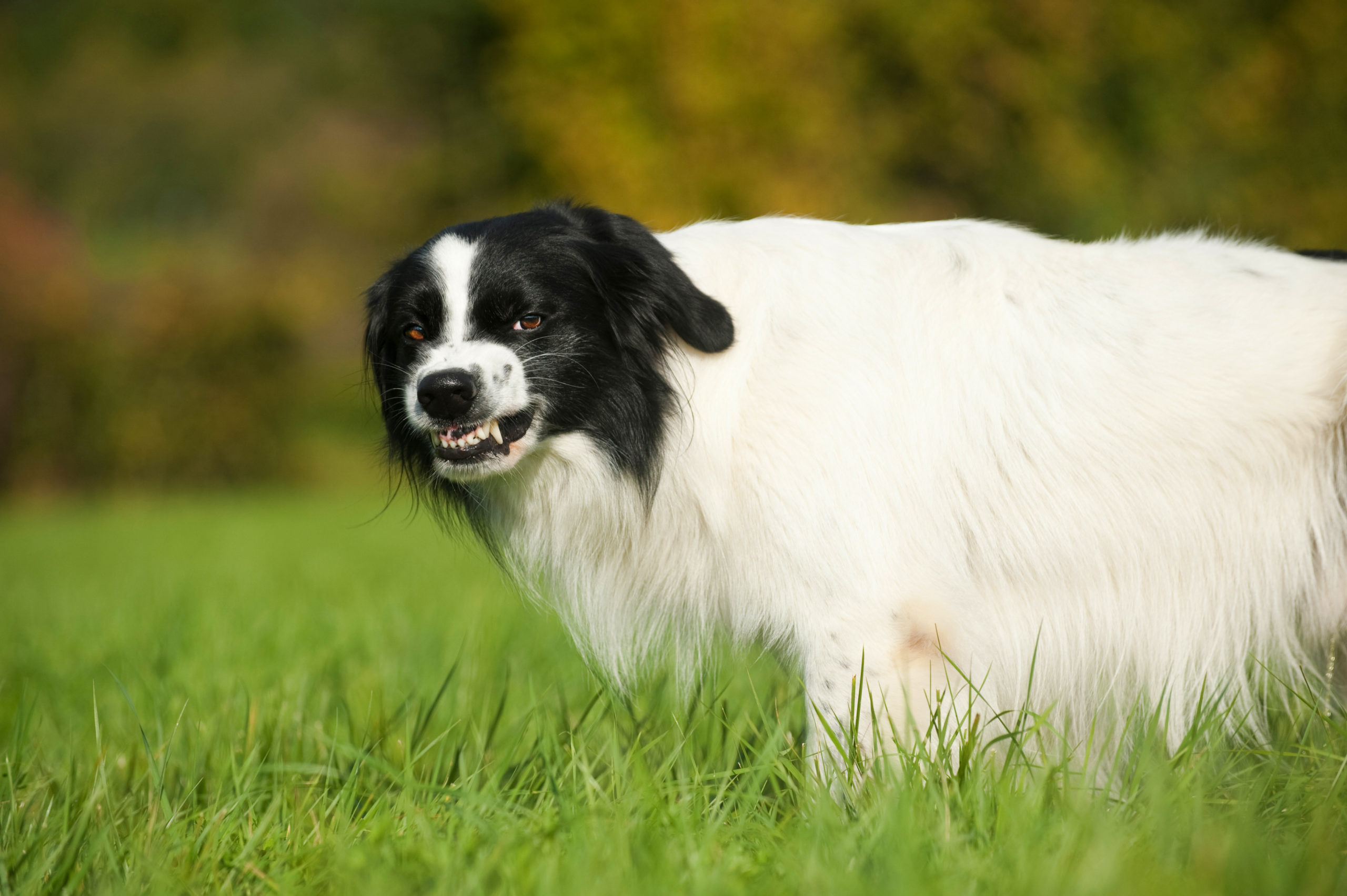
Reactivity is Rough.
Guess what?
You don’t have to do it alone.
Let’s solve your dogs reactivity together
Why Do Some Dogs Develop Reactivity?
When it comes to why certain dogs are reactive, and some aren’t, it can come down to a few things, one of which, and a very important one is breeding. As I suggested a second ago,
Breeding
it starts it all starts with with your puppies, parents, if your puppies parents are intelligent, or know if they’re sorry, if their breeders are intelligent that the dog parents don’t necessarily need to be intelligent. But if their brains are intelligent, they are selectively picking dogs who have sound temperament, who are able, in all sorts of situations, they are not scared of fireworks, they are not prone to separation anxiety, they are not prone to reactivity.
They are well adjusted dogs, who all going to make phenomenal genetic donors essentially because our puppies take on parts of their parents through both genetics and epigenetics.
Whilst I’m not going into it today, please know that they can take aspects of learned behaviour through genetics.
For example, Indie. Indie is a reactive dog. His mum was in a kennel in the yard, blocked away from the puppies and blocks away from the people coming to see the puppies.
I was told that she doesn’t necessarily like people come in to take our puppies away. Me, as a new puppy parent, totally bought that.
Totally didn’t realise that it was a really big red flag.
In hindsight, I know and understand these things. And that’s why I’m trying to give you this information. She was a reactive dog. So it meant that Indie was scuppered from the start. And that’s a really blunt way of putting it, but, and he was a really well socialised puppy. Really well socialised so much so that I got compliments from strangers on how well a German Shepherd puppy were socialised. And that changed when he hit the second fear phase.
Breeder influence
hat first eight weeks, they actually gained something like 50% of their brains entire volume for when they’re being an adult. And that is something that gets filled very, very quickly. And if you’ve got a good breeder, they will ensure that it’s filled with all the right stuff, okay, so that they will ensure that they meet a cat.
They will, they will ensure that they get exposed to loud noises, they will ensure that they get exposed to all sorts of things that just make life with that dog less stressful.
And that, in turn, then comes to the fact that that dog is well adjusted for society.
Trigger stacking
Because we then have something called trigger stacking. I know all these terms and all these pieces of terminology they do they do come more naturally the more you learn about them. So I’m hoping that I’m not overwhelming you guys right now please do comment and tell me if I am and I will take a step back in the future.
the more stresses in a dog’s life, the higher that higher they climb off, climb up a ladder. I used to describe it as like a boiling pot. That can also be exhibit or effect reactivity.
Socialisation
We must be gentle with things like socialisation, and adjusting our dogs to our world because the world of humans is not the world of dogs, right? That’s not something that is going to ever come that well, not ever. But it’s not something that comes naturally to them from the get go.
Need more help with Socialization? Grab my Ultimate Socialization Ebook!
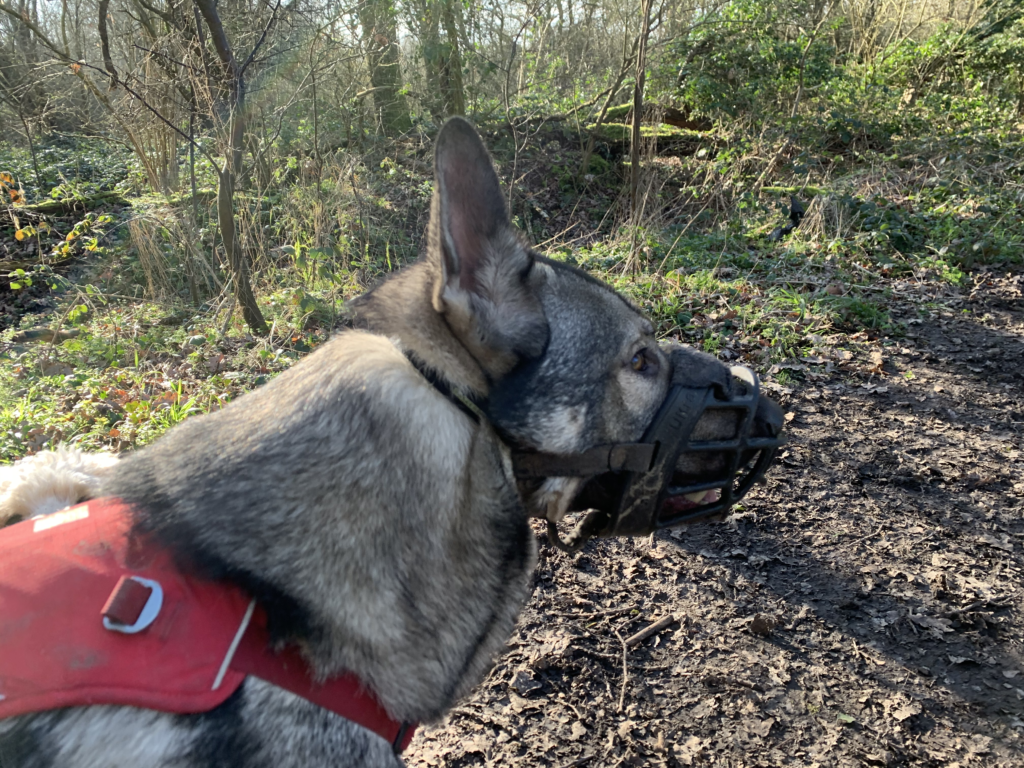
Medical
Then we have medical. Yes. So a dog who is constantly in pain, whether that’s a subtle niggling pain of something like gastro intestinal discomfort, so tummy. Tummy problems, and they’re going to be grouchy. They can’t communicate to you and go “Mom, Dad, really sorry. But today, I just feel like poop. And I don’t want to go walking, please don’t make me go talk to the next one’s Labrador, because you know, I just can’t do it.”
And if they could, the world would be a much easier place, right?
If we could just get that information from our dogs, all of a sudden, everything would be so much easier, but we can’t.
We have to try and interpret these things.
To anybody who gets a “suddenly” reactive dog, go get them checked by that, categorically, okay, you want to make sure that they are checked out, make sure that they are happy and healthy inside before you start training.
Reactivity is a mountain, but it’s climable
It does not mean that you have failed them.
It does not mean that they are broken.
It does not mean that they are never going to recover.
Reactivity is a not short term thing, but it’s definitely a thing we can overcome. These things are tough, they take a lot of dedication, they take a lot of time and a lot of understanding and a lot of treats. But typically, but they can be overcome. They are not essentially a life sentence. So please, please don’t worry about that.
I love knowing your experiences, so if you want to reach out, please do.
And if you want help? I’m also your girl.
If you want to do more than just start your journey with your reactive dog, then why not sign up to my forthcoming course, Rebarkable Reactives!

Author, Ali Smith
Ali Smith is the Positive Puppy Expert, dog trainer and is the founder of Rebarkable. She is passionate about helping puppy parents get things right, right from the start. To help create a puppy capable of being a confident and adaptable family member and keep puppies out of shelters.
Ali has won multiple awards for her dog training, and has had her blog (this blog!) rated as 2021’s worlds’ best pet blog!
source https://rebarkable.com/intro-to-reactivity-in-dogs/
source https://melissajreynolds.tumblr.com/post/672631921699864576
from Melissa Reynolds https://melissajreynolds.blogspot.com/2022/01/intro-to-reactivity-in-dogs.html
source https://melissajreynolds.tumblr.com/post/672639424402751488
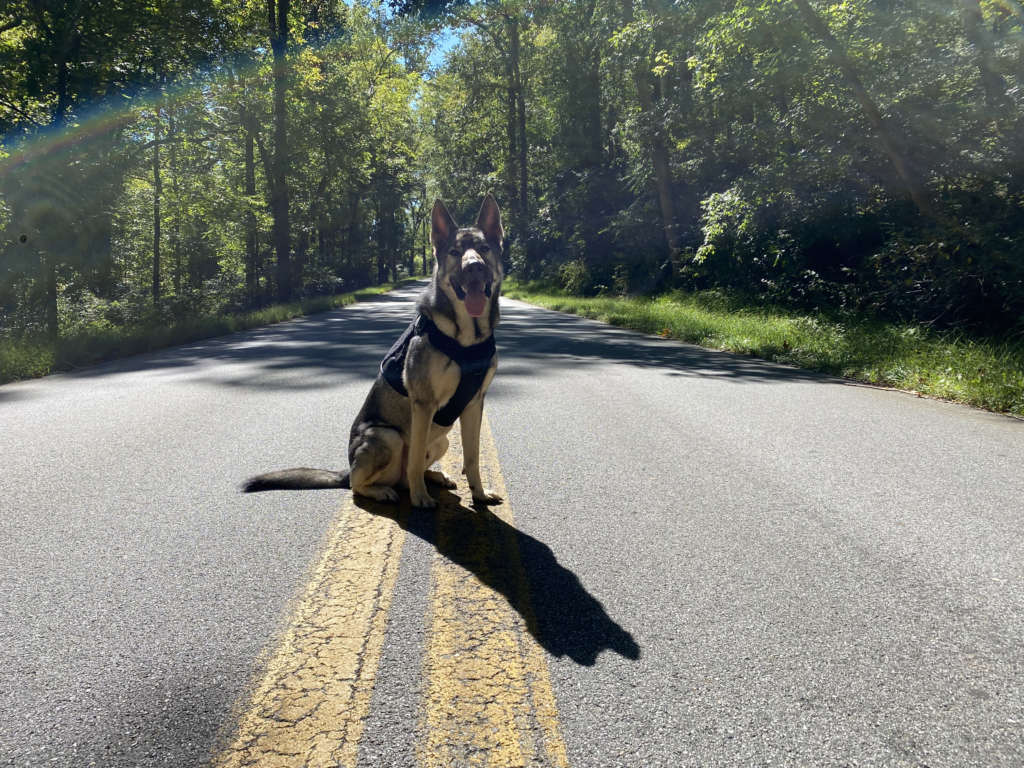
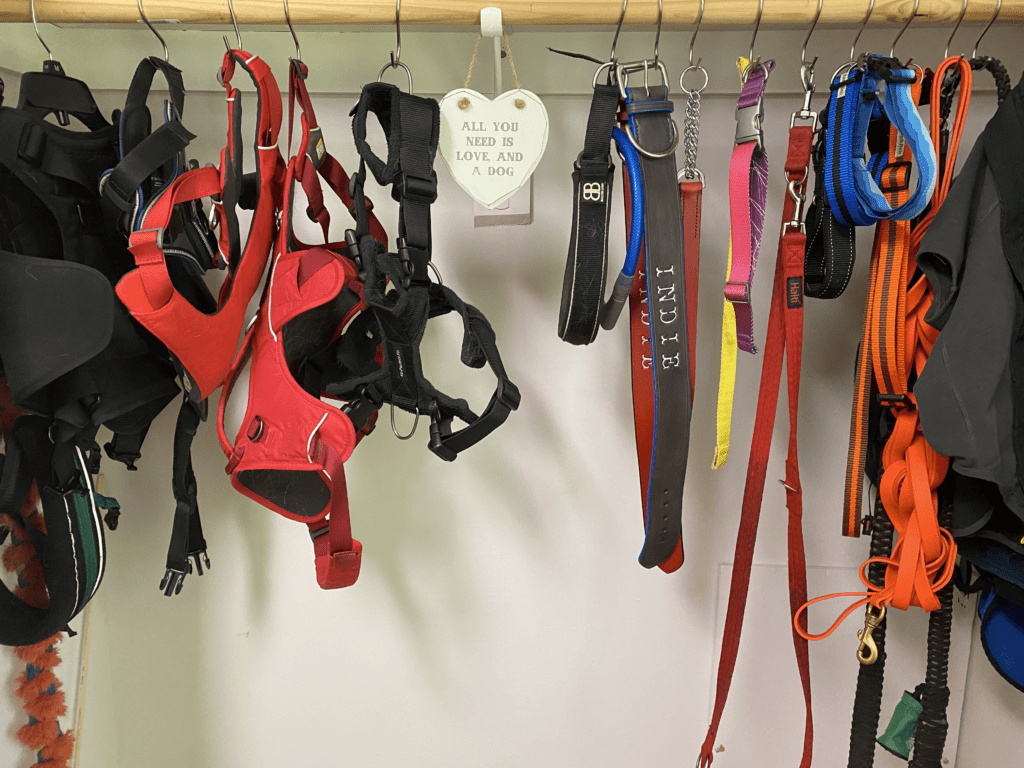

Comments
Post a Comment